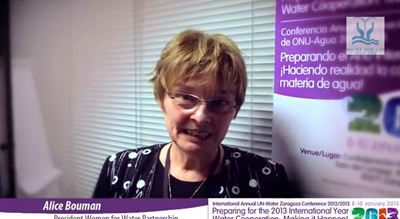- ON THE DECADE
- THE DECADE'S CAMPAIGN
- REPORTING ON PROGRESS
- THE DECADE'S PROGRAMMES
- FOCUS AREAS
-
- Access to sanitation
- Financing water
- Gender and water
- Human right to water
- Integrated Water Resources Management
- Transboundary waters
- Water and cities
- Water and energy
- Water and food security
- Water and sustainable development
- Water and the green economy
- Water cooperation
- Water quality
- Water scarcity
- FOCUS REGIONS
- RESOURCES FOR
- UN e-RESOURCES
International Annual UN-Water Zaragoza Conference 2012/2013
Preparing for the 2013 International Year. Water Cooperation: Making it Happen! 8-10 January 2013
Irrawaddi river in Myanmar
 Interview with Alice Bouman. President of Women for Water Partnership
Interview with Alice Bouman. President of Women for Water Partnership Ayeyarwady (Irrawaddi) River is an important lifeline for Myanmar. The 2170 km river stretch is home to different ethnic groups of which many live in poverty and lack access to safe water and adequate sanitation services The river has high hydro-electrical potential and industrial use of water is growing. At the same time, a large portion of the Myanmar rural population depends on the river to sustain their livelihood. The Myanmar national development strategy concentrates on poverty reduction and rural development. The 2012-2015 UN-strategic framework for Myanmar has four priorities: 1) inclusive and sustainable growth, 2) equitable access to social services, 3) building resilience to natural disasters and climate change, and 4) good governance. Water, although not explicitly mentioned as a priority area, is key for the sustainable development of the country. With 75% of the population residing in rural areas and agriculture, livestock and fishery being the principal source for their livelihoods, agricultural water use is the first priority in water resources management at present.
In the Irrawaddi river there is no river basin organization although many of its functions are covered by the Irrawaddi research commission that unites scientists and people from the Ministry. Standing at a crossroad, Myanmar is in a unique position to develop water cooperation from scratch. Significant hydropower development opportunities cannot be exploited without settling the disputes among meighbouring countries. Cooperation among social groups sector of the economy may be an important precondition to root international agreements, as for example between Myanmar-China, on a firmer basis. This requires following an inclusive approach that would be able to involve ethnic groups and women associations. Good water governance would require to address all cooperation levels simultaneously, and include bottom-up mechanisms that ensure that institutional frameworks have the intended effect, address social, economic and environmental issues alike, and benefit different stakeholders equally. Governments may use the natural social structures in the system, considering the appropriate level of intervention. This is the case of women that have social networks that already exist. Before the start of cooperation those at the table need to be empowered and invest to make sure that all partners are equal. It is a slow process: create trust according to the demand, and support their expertise in order to have them empowered.
>> Organizers
>> Key questions
>> Expected outcomes
>> Agenda
>> Participants
>> International Year and WWD 2013
>> UN initiatives on water cooperation
>> UN Water Convention
>> UN Watercourses Convention
>> Challenges for water cooperation
>> Addressing cooperation: tools and mechanisms
>> Mediation and dispute resolution mechanisms
>> Alternative Dispute Resolution Approaches
>> Water cooperation: nations and stakeholders
>> Water cooperation in rural areas
>> Water cooperation in cities
>> Interview questions for case study presenters
>> World Water Day 2013
>> World Water Week 2013
>> The UN Global Compact
>> Intensively developed aquifers
>> Stakeholders platforms in Spain
>> Field visits
>> Cases on water cooperation
>> Conference daily
>> Conference flyer
>> Conference interviews
>> Conference poster
>> Information briefs
>> Presentations from participants
>> UN water cooperation reports
>> Video interviews with participants
>> Video recording of sessions
>> Water cooperation in the media
>> Web banners
Copyright | Terms of use | Privacy notice | Site Index | Fraud alert | Help




